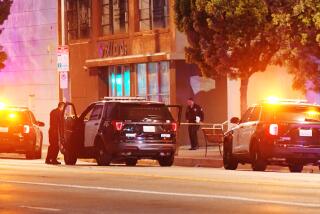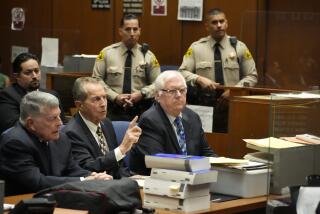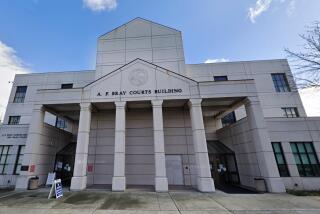Client Kills His Lawyer, Himself at Law Library : Crime: Witness quotes gunman as saying ‘attorneys have ruined the world’ before he shot the victim several times.
- Share via
Saying “attorneys have ruined the world,” a gunman shot and killed his lawyer inside the Los Angeles County Law Library on Monday afternoon and then killed himself as dozens of people ran for cover, police and witnesses said.
James Sinclair, 62, approached his attorney, Michael Friedman, 38, at a photocopy machine and fired several rounds before his gun jammed. No library patrons were injured.
“It was something like ‘attorneys have ruined the world, attorneys have done enough damage to the people,’ ” said Yvette Sterling-Fajalu, an attorney who was nearby. Terry Dawson, who was also present, said he heard the gunman say “now is the day of the justice” after firing at Friedman. Another witness heard the gunman say “I finally got you.”
“It was frantic inside. People were scattering all over the place,” said library patron Nathaniel Richardson, who said Sinclair fired at Friedman even after he had fallen.
Mike Qualls, a spokesman for the Los Angeles city attorney’s office, said Sinclair was suing the city over an allegation of excessive police force stemming from an incident in December, 1988, at the Terminal Annex Post Office.
In that case, Sinclair was taken into police custody after arguing with several people in line who were smoking, said Assistant City Atty. Honey A. Lewis, who was familiar with the case. Sinclair claimed he suffered psychological problems as a result.
Sinclair and Friedman, both of Los Angeles, had appeared in Los Angeles Superior Court on Monday morning and the two were set to return for the beginning of the trial in the afternoon.
Police said Sinclair was armed with two handguns and a pair of handcuffs. Witnesses said he was dressed in a blue suit and had sat quietly in the front lobby at the library on 1st Street and Broadway for three hours before the 1:30 p.m. shooting.
As Friedman used a copy machine about 100 feet from the lobby, Sinclair approached and fired three or four rounds at him. Witnesses overheard him mutter several sentences during the shooting.
After firing several rounds, police and witnesses said, the gunman’s weapon jammed and he tried to open the door to an adjacent typing room.
Dawson, who had just stepped inside the room, looked through the door window and saw Sinclair with his gun in the air. Sinclair reached for the doorknob and Dawson ducked.
“I thought: ‘Oh, God, this is it,’ ” Dawson said.
Paralegal Zane Varner, who was watching from several feet away, said that for a moment Sinclair looked “like he didn’t know what to do.” Moments later, he used the second gun to shoot himself in the head.
This was the second case involving an allegation of excessive police force that Sinclair had brought against the city, Qualls said. In January, the city won a federal civil rights suit in which Sinclair claimed that he had suffered arthritic pain in his thumbs and psychological troubles after being handcuffed by police after an argument while officers were investigating a suspected car theft.
Lewis, who represented the city in the federal case, said Sinclair had “physically and verbally interjected himself” into a street investigation in which police were questioning suspected car theft suspects in early 1988.
“He was screaming and yelling and telling police he was an FBI informant,” Lewis said. When officers noticed he was carrying handcuffs and Mace they handcuffed him, but did not arrest him. Sinclair sued. A federal jury ruled in favor of the city.
In that case, Sinclair told a psychologist that he had fantasized about killing the police officer who handcuffed him and then committing suicide, Lewis said. As a result, the federal judge ordered increased security in the courtroom, but Sinclair maintained a professional demeanor during most of the case.
Lewis said Sinclair had only recently retained the attorney in the case that was to begin Monday. For months before the trial, she recalled, he had represented himself in the case and had been frequently seen in the city attorney’s office.
More to Read
Sign up for Essential California
The most important California stories and recommendations in your inbox every morning.
You may occasionally receive promotional content from the Los Angeles Times.










